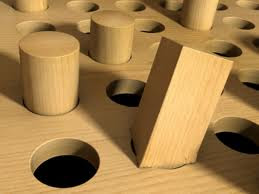Saturday Evening Post cover
Like with all expressions, humor offers a window into an individuals mood or state of mind. In terms of development, humor reveals behavior that is narcissistic and self-absorbed as well as altruistic.
Rather than being an age-related theory of humorous development, with the common adage that kids prefer "bathroom humor" - not all people start out egocentric and end up with the high guiding principles. Most people fall somewhere in between, which while often times stressful, at least offers with it an ideal to work toward, and more importantly, ideas to laugh about.
(This image pretty much sums up my academic career)
LEVEL I
At level I, the individual is mostly concerned with the self. Egocentrism leads to tyrannical behavior. These individuals do not see their own imperfections; instead, they focus on the flaws of others. A person at Level I uses other people for self-gratification and self-aggrandizement.
Humor expressed at each level mirrors the sentiments of the individual. In Level I, for example, individuals are often attracted to others for superficial reasons, mostly so that they can show off to others. Here, jokes that focus on superficiality are typically expressed and enjoyed.
Parents at this state of development expect their children to be reflections of their life goals so that it reflects well on them. Essentially, the needs of the other person are not taken into account. The motto at Level I might be, "I'm perfect, but you're not."
In Hewitt and Flett's (1991) Multidimensional Perfection Scale, this has been labeled, "other-oriented perfectionism." Other-oriented perfectionists set up unrealistic standards for others and focus on their flaws; this is accompanied by blame, lack of trust, and feelings of hostility toward others (Hewitt & Flett, 1991).
When others do not meet their expectations, these individuals punish others emotionally through disapproval, guilt, or the removal of privileges (as with children). This type of behavior is a recipe for dysfunction. The humor that often attracts people in Level represents the lowest level of humor attached to human expression. Creating and sharing this type of humor affects people in two distinctly different ways (1) Humorously exposing the behavior that needs to be changed without damaging someone's fragile sense of self; (2) Propagating negative behavior, giving others the sense that it's "okay" because "since there's so much of it out there, it must be okay."
I have observed that comedians who seem to run out of material often times resort to low-level humor.
LEVEL II
Psychologists generally view perfectionism as a "pervasive neurotic style" - at this level of development, individuals are often at the mercy of the social group. They continually ask themselves, "What will people think of me if I ...?"
Facebook, while offering a playground for many emotional expressions as well as the easy, nearly instantaneous sharing of photos with friends and family, is where neurotic forms of perfectionism are most visible. Many people who actively participate on Facebook post updates and images that reveal a deeper insecurity and feelings of inferiority toward others, judging themselves as lacking in comparison.
While personally I had a good time actively participating on Facebook during my research into humor, I did observe that the majority of the people exhibited a polarized "all or none" type of behavior, i.e., "Either I am perfect or I am worthless."
Comedians who perceive perfectionism as a negative trait focus primarily on the expression of perfectionism at Level II. The person needs to excel in order to bolster flagging self-esteem. The chief sign here is obsession.
On Perfectionism: What's Bad about Being too Good,
Adderholdt-Elliott & Goldberg (1987; revised 1999, p.4) wrote:
Perfectionists...live in a constant state of anxiety about making errors. They have extremely high standards and perceive excessive expectations and negative criticisms from others, including their parents. Sometimes those external pressures are real, sometimes they come from within. Perfectionists question their own judgments, lack effective coping strategies, and feel a constant need for approval. They fear being exposed as frauds or imposters. Many avoid the healthy risks that will help them grow, procrastinating, or refusing outright to try new experiences for fear of failure.
This behavior is characterized by a strong motivation to be perfect, accompanied by the belief that others have perfectionistic expectations of our behavior as well as the belief that they are living perfect lives and harshly judging us for not measuring up.
LEVEL III
Healthier forms of perfectionism emerge at higher levels of development. At Level III, the individual becomes a seeker of self-perfection. Instead of feeling inferior to others or feeling inadequate to meet the expectations of others, the person becomes aware of his or her potential to be "enlightened" and feels inferior to that potentiality.
A glimpse of the possibilities in oneself for integrity, empathy, wisdom, and harmony is a powerful motivator and incentive for personal growth. The longing to become one's best self propels the individual to seek out illusions, recognize truths about oneself, and transform egocentric behavior and lower-level instincts toward one's highest self. This undertaking is an arduous journey that requires support and encouragement for undertaking this challenge.
Life can offer drama lovers fantastic levels of reality, from persecutors, victims, and rescuers to winners and losers. However, at a more evolved layer of TP, we find 3- and 4-ply layers of reality where there are no polarities; there is only oneness, i.e., we're all in this together.
At Levels I & II, the pull to negativity is very strong, and there is little, if any, awareness that a higher reality is possible. "Maybe for others, but not me" is a typical lower-level response. In the higher levels - Level IV & V - the pull is equally as powerful, actively directing the personality. Given that all expressions exist, there are subtle truths to each that can be balanced toward the feeling of harmony without getting trapped in new illusions of grandeur that often accompanies early enlightenment.
"We see in others what we first see in ourselves," was my response to Dr. Robert Graham of the Repository for Germinal Choice, a sperm bank in Escondido, California, which was dubbed the "Nobel prize sperm bank" by media reports at the time.
Dr. Graham responded to me: "Your writings on wisdom, a subject on which I was once more familiar, but have not since considered, deserve many re-readings." While I have long since held this belief, not everyone has appreciated my sharing of this sentiment (note the level III'ness in this comment).
At level III, humor reflects a higher, but still caught in the lower, reality. A struggle emerges from the climb out of habitual ways of being in the world toward a higher reality. Descartes laid the foundations for this type of self-evolving awareness in his Discourse on the Method of Rightly Conducting the Reason and Seeking Truth, stating that, "Good sense is, of all things among men, the most equally distributed; for every one thinks himself so abundantly provided with it, that those even who are the most difficult to satisfy in everything else, do not usually desire a larger measure of this quality than they already possess."

Individuals at Level III live with a vertical tension between "what is" and "what ought to be" in oneself. This is not a comfortable experience, which leads to two distinct outcomes: (1) the abandonment of continual personal adjustment in favor of a more comfortable experience, or (2) the acceptance of "not knowing" in favor of continual growth and development, which can lead to the perfection of personality.
The types of humor that appeal to Level III individuals include:
1. Hierarchization
(critical perception and evaluation of one's values)
2. Dissatisfaction with oneself
(frustration and anger with what is)
3. Inferiority toward oneself
(frustration at one's inadequacies)
4. Disquietude with oneself
(agitation and anxiety with what is)
5. Astonishment with oneself
(surprise and shock in regard to what is)
6. Shame
(embarrassment over one's deficiencies)
7. Guilt
(anguish over moral failure)
8. Positive maladjustment
(antagonism against social opinion and protest against violation of intrinsic ethical principles)
(Dabrowski, 1977, p. 44)
While the simultaneous removal of doubt in conjunction with the acceptance of not knowing is difficult, these inner forces do express different ways of evaluating one's personality and reflecting on one's character. They epitomize the work associated with inner transformation. Despite significant ups and downs there is usually an upward trend given that higher-level reality exercises a stronger influence on the personality than that of lower-level realities.
LEVEL IV
At Level IV, much of the inner polarity has been transformed and the person is able to commit to living a life permeated by high ideals. There is a greater capacity for self-reflection, for acceptance of others and of self. There is more self-regulation, which minimizes the control that baser desires have over the individual as well as the possessiveness associated with trying to control others. Compassion and understanding of he plight of others is consistently maintained. Perspective is informed by a clearer vision of the meaning of life experiences. The humor at this stage is a representation of wholeness and the appreciation of inherent perfection in all of life.
LEVEL V
Level V is the perfection of the personality. It is life without personal conflict. Here, behavior is guided by the highest principles. At this amazing level of human development, the individual becomes a wise teacher, guide, and example for others.
Autonomy from the lower layers of reality are personified in this individuals personal expression as well as in their humor. Life is lived in service to all - including the self - of humanity, not in service of the ego. The motto for this type of expression and humor is, "All is love."
































































